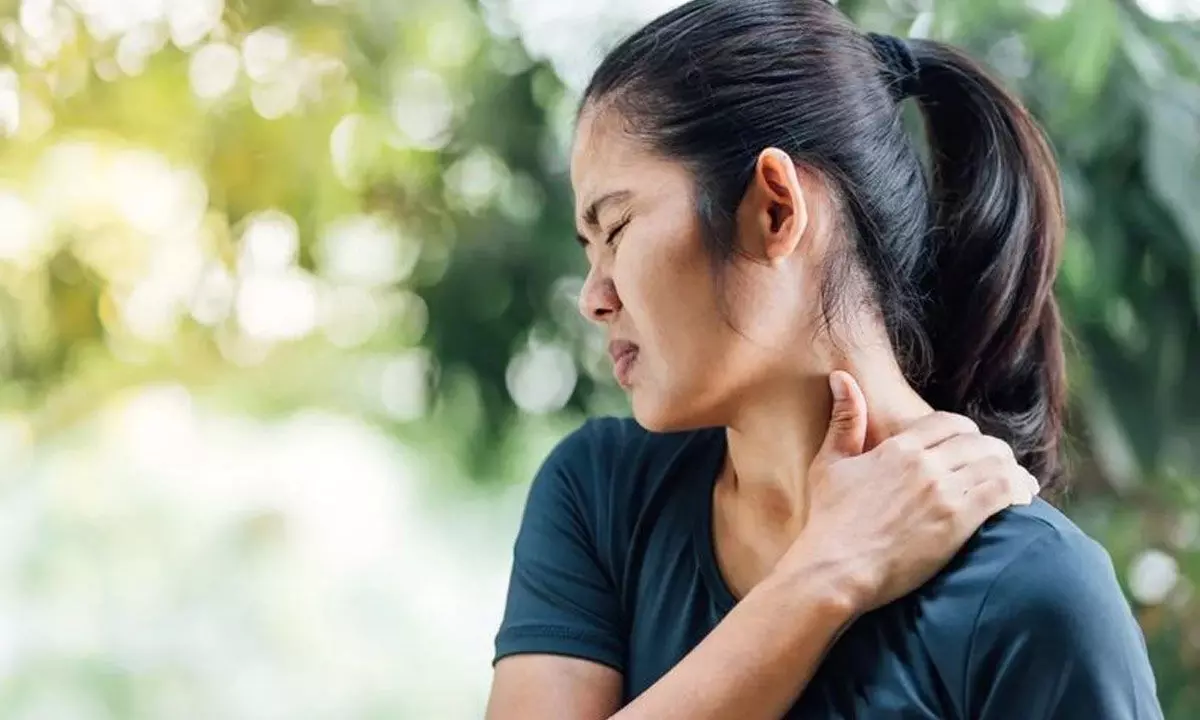Live
- They always want me to win, and now I feel lucky to have been offered a story like ‘Zebra’: Satyadev Kancharana
- ‘Democracy first, humanity first’: PM Modi in Guyana's parliament on two countries' similarities
- PKL Season 11: Telugu Titans register third straight win to top standings
- Is Pollution Contributing to Your COPD?
- NASA Unveils Underwater Robots for Exploring Jupiter's Moons
- Additional Central forces arrive in violence-hit Manipur
- AR Rahman and Saira Banu’s Divorce: Legal Insights into Common Issues in Bollywood Marriages
- 82.7 pc work completed in HPCL Rajasthan Refinery area: official
- Curfew relaxation extended in 5 Manipur districts on Friday
- Tab scam prompts Bengal govt to adopt caution over fund disbursement
Just In
Low Vitamin D levels: A silent threat to women’s bone health


Vitamin D plays a pivotal role in calcium absorption, which is fundamental for bone strength. Without adequate Vitamin D, calcium supplementation alone is ineffective. The deficiency in Vitamin D can lead to weakened and brittle bones, making individuals more vulnerable to fractures and osteoporosis—a condition marked by reduced bone density and increased fragility
Women’s bone health is increasingly under threat due to insufficient levels of Vitamin D, a crucial nutrient often referred to as the “sunshine vitamin.” This vital vitamin is essential for maintaining strong bones and preventing conditions such as osteoporosis and arthritis. However, experts are raising alarms about its deficiency, particularly among women who are more susceptible to bone-related issues.
Vitamin D plays a pivotal role in calcium absorption, which is fundamental for bone strength. Without adequate Vitamin D, calcium supplementation alone is ineffective. The deficiency in Vitamin D can lead to weakened and brittle bones, making individuals more vulnerable to fractures and osteoporosis—a condition marked by reduced bone density and increased fragility. Dr. Akhilesh Yadav, Associate Director of Orthopaedics & Joint Replacement at Max Hospital, Vaishali, highlights the importance of Vitamin D in bone health. “We are frequently encountering women with bone issues linked to low Vitamin D levels. This nutrient is crucial for absorbing calcium, which in turn keeps bones robust. Many women fail to get sufficient Vitamin D, elevating their risk of osteoporosis and fractures,” he explains.
Osteoporosis is a growing concern, especially for women post-menopause due to hormonal changes that affect bone density. The condition often begins with low levels of Vitamin D, compounded by age-related factors that reduce the skin’s ability to produce this essential vitamin from sunlight.
Dr. Sagar Hingrajiya, Consultant Orthopaedic at Bhailal Amin General Hospital, Vadodara, emphasizes the widespread issue of Vitamin D deficiency. “Maintaining adequate Vitamin D levels is crucial for optimal bone health. The deficiency can lead to severe health issues, with osteoporosis being a significant concern among women, particularly after menopause,” he says.
The symptoms of Vitamin D deficiency are often subtle but can manifest as chronic fatigue, bone pain, or muscle weakness. Regular monitoring is essential, especially for women over 40, who are at a higher risk for osteoporosis. Dr.Hingrajiya advises, “Regular testing of Vitamin D levels is important. Persistent low levels may require intervention in the form of supplements, but it’s crucial to consult a healthcare provider to avoid potential adverse effects from inappropriate self-medication.”
Vitamin D is synthesized when the skin is exposed to sunlight, particularly the midday sun between 10 a.m. and 3 p.m. However, lifestyle factors, such as indoor work and limited sun exposure, contribute to widespread deficiencies. Dr.Hingrajiya points out, “Many people miss the optimal time for Vitamin D synthesis due to lifestyle and misconceptions. It’s essential to spend at least 10-30 minutes in the midday sun several times a week, engaging in activities like walking or gardening while balancing sun exposure with skin protection.”
Diet also plays a role in managing Vitamin D levels. Foods rich in Vitamin D, such as fatty fish, fortified dairy products, mushrooms, and eggs, can help supplement the nutrient. However, dietary sources alone may not always suffice. For those with limited sun exposure or dietary intake, Vitamin D supplements may be necessary. Dr. Yadav recommends, “Consider taking Vitamin D supplements if you have limited sunlight exposure or dietary intake. Consult your doctor to determine the appropriate dosage and regularly test your Vitamin D levels to prevent deficiencies.” In summary, ensuring adequate Vitamin D is crucial for maintaining bone health, particularly for women who are at higher risk for osteoporosis. By balancing sun exposure, maintaining a healthy diet, and monitoring Vitamin D levels, women can better protect themselves against bone-related issues and enjoy a healthier, more active lifestyle.

© 2024 Hyderabad Media House Limited/The Hans India. All rights reserved. Powered by hocalwire.com






